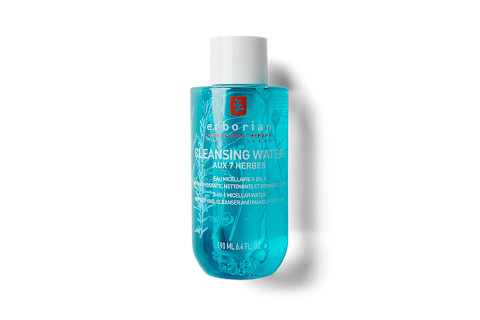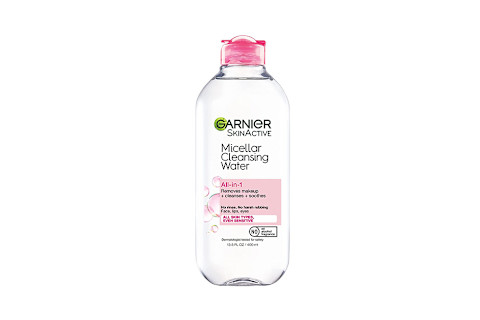What Is Micellar Water? Usage Tips + The Best Products

There are plenty of different ways to remove makeup, but some are better for your skin than others. Many skin experts agree that chemical-packed makeup wipes may not be the healthiest choice, but the best option is up for debate.
In reality, the healthiest choice is one that you’ll commit to. One popular method is using micellar water on a cotton round to remove debris and product, but is this technique good for your skin? Below, the 101 from experts.
What is micellar water & how does it work?
First question, what exactly is micellar water? According to cosmetic chemist team and founders of Chemist Confessions Gloria Lu and Victoria Fu, “Micellar water is more of a marketing term that has involved into several formats, the main two being: water-based cleansing water and also as a fancy name for a bi-phase makeup remover.”
Lu and Fu note that these formulas, “Contain ‘micelles’, or little balls of surfactants with a water-loving part and an oil-loving tail.” When micells touch the skin, they effectively remove makeup and grime (SPF included).
This form of makeup removal originated in France but has grown in popularity worldwide over the past decade or so, mainly due to the gentle and hydrating nature of micellar water and the ease of use.
The way in which micellar water has evolved in recent years, becoming a popular ingredient in toners and cleansers as well
What are the benefits of micellar water?
Micellar water didn’t become popular on chance; this ingredient actually has a host of benefits for the skin. Below, a few to note:
- Better than makeup wipes: “Because it works to gently but effectively lift makeup off the skin, it doesn’t require as much vigorous rubbing,” board-certified dermatologist Marisa Garshick, M.D., FAAD explains.“Additionally, some makeup wipes may contain ingredients that can be drying,” she says.
- Safe for sensitive skin: “A fragrance-free and hypoallergenic micellar water is perfect for sensitive skin and for dry skin,” board-certified dermatologist .Blair Murphy-Rose, M.D., FAAD explains.
- Provides a first cleanse: In the method of double-cleansing, the first go around is supposed to remove dirt, makeup, SPF, and debris so the second cleanse can fully wash the skin. When using micellar water, the first step is taken care of. “We've had pretty good success using micellar water as makeup remover for most basic makeup,” Lu and Fu explain.
- Can be environmentally sustainable: Using micellar water on single-use cotton pads is certainly not eco-friendly (neither are makeup wipes, we should note). However, there are ways to use this ingredient in a sustainable fashion—more on that in a bit.
- Hydration boost: “The oil droplets in soft water are actually quite hydrating to dry skin and don't disrupt the natural pH of skin like classic foaming cleansers,” board-certified dermatologist at Schweiger Dermatology Group in NYC .Blair Murphy-Rose, M.D., FAAD tells mbg.
- Travel-friendly: “It's also great for people who travel a lot and don't always have access to water—micellar water will clean most makeup, oil and dirt with just a swipe of a cotton ball,” Nazarian explains. However, you should rinse off micellar water post-use if you can (we’ll explain why in a bit).
How to use micellar water
In order to use micellar water correctly and get the most out of your product, follow these tips.
As a makeup remover
The first and most popular choice: Use micellar water to remove your makeup. Simply apply micellar water to a cotton round or cotton ball (or opt for reusable ones) and swipe it across your face.
It’s best to avoid adding pressure to the skin during this process, so just let the cleansing agent do it’s job. Remember, you’ll follow up with a second cleanse afterward, so it’s okay if your skin isn’t squeaky clean.
After this step, rinse your face and go in with your normal cleanser and skin care routine.
Pre- or post-workout
If you go straight from work to the gym, micellar water can be a quick way to remove makeup before you start sweating, Murphy-Rose notes.
After you remove your makeup, rinse off your face. Not everyone will be sensitive to the surfactants used in micellar water, but some can be. “My recommendation is to always rinse the micellar water off just to be safe,” Nazarian says.
If you don’t have time to fully wash your face with a second cleanser before you workout, a micellar water cleanse and quick water rinse will be just fine. It’s a good idea to apply a lightweight moisturizer afterward to prevent your skin from drying out as well.
As a gentle toner
If you are one to skip face washing in the morning and opt for a toner instead, you can certainly consider micellar water a simple option. Since it lifts off excess oil, it's great for those who want to refresh a shiny T-zone in the morning, without the use of alpha- or beta-hydroxy acids.
However, not every micellar water should be used as a toner, but we’ll dive deeper into that in a bit.
As an eco-friendly swap
Look, I understand the appeal of makeup wipes: They’re easy, they work well, and you’ve probably been using them forever without a problem. However, they simply are not sustainable for the environment, so let that be one reason to switch to micellar water.
To keep your routine as environmentally-friendly as possible, use reusable cotton rounds or a soft towelette instead of single-use products.
What skin types should and shouldn't use micellar water:
The good news is that micellar water is fairly well tolerated for most people. Still, Lu and Fu agree it should always be rinsed off, even if it claims to be a “no-rinse” formula. This step will ensure any residue left behind is washed away.
While micellar water can remove most basic makeup, it’s not necessarily going to melt away super stubborn products. For anyone who wears heavy foundation or tacky mascara, you may want to opt for oil-cleansers instead.
Lastly, anyone with breakouts should use micellar water with caution. Because this ingredient isn’t going to remove 100% of makeup every time, oil-cleansers with noncomedogenic ingredients like grapeseed or jojoba oil may be a better choice.
Ingredients that work well with micellar water
While you can get micellar water on its own, there are lots of other ingredients it's often formulated with. Garshick notes that the best type of ingredient to be paired with micellar water is anything that will hydrate the skin and support the skin barrier. Below, a few common additions.
- Ceramides: When used topically, ceramides mimic your skin’s natural moisturizing system and they are non-sensitizing to the skin and the eyes—both benefits making them a perfect ingredient to use with micellar water.
- Glycerin: This humectant is found in plenty of formulas, and for good reason. Glycerin helps to pull water into the skin, sooth irritation, and buffer cleansing and active formulas.
- Aloe: Not only does aloe vera extract hydrate the skin, but it also contains a natural version of salicylic acid, making it a perfect addition for anyone prone to breakouts.
- Hyaluronic acid: As you’ve probably heard by now, hyaluronic acid and dry skin make a great pair. When combined with cleansing ingredients like micellar water, HA will ensure your skin doesn’t dry out post-use.
Is micellar water toner?
Some people claim that micellar water is classified as a toner, others say it’s a cleanser. To be fair, both are true. See this ingredient does effectively cleanse the skin of makeup and dirt, but it can also be used as a gentle toner.
However, to use micellar water as a toner you’ll want to make sure you find a formula that doesn’t leave behind a residue. Lu and Fu note that “bi-phase” micellar waters generally do leave behind some grime, so don’t use those if you’re going to leave it on the skin.
To be frank, it’s a good idea to find a product that’s actually formulated to be left on the skin as a toner (or an essence). Not sure where to look? Here’s our curated list of the best clean toners on the market right now.
All of this to say: If you use micellar water as a toner and you love it, keep on doing your thing. Every step in skin care should be personalized and therefore, there is no right or wrong.
Is micellar water bad for the environment?
Micellar water is generally the first choice people reach for when quitting makeup wipes, but is this whole process actually more sustainable? The truth is that it can be, if you use reusable cotton rounds or super gentle towelettes.
Most of the reusable cotton products out there come in a pack and can be used throughout the week. When you do your laundry, toss them in a delicates bag and voila, you have fresh rounds to use without wasting cotton. Here’s a few of our favorite options if you’re on the hunt.
The best micellar water
FAQ
What is the point of micellar water?
According to cosmetic chemist team and Founders of Chemist Confessions Gloria Lu and Victoria Fu, “Micellar water is more of a marketing term that has involved into several formats, the main two being: water-based cleansing water and also as a fancy name for a bi-phase makeup remover.”
Lu and Fu note that these formulas, “Contain ‘micelles’, or little balls of surfactants with a water-loving part and an oil-loving tail.” When micells touch the skin, they effectively remove makeup and grime (SPF included).
What is the difference between makeup remover and micellar water?
Micellar water contains gentler surfactant (AKA cleansing agents) than many other makeup removers. For this reason, micellar water tends to be less irritating and more hydrating for the skin.
Do I need to wash my face after using micellar water?
After you remove your makeup, rinse off your face. Not everyone will be sensitive to the surfactants used in micellar water, but some can be. “My recommendation is to always rinse the micellar water off just to be safe,” Nazarian says.
The takeaway
Micellar water is a gentle ingredient used to remove makeup, dirt, and grime from the skin. Be sure to rinse micellar water off and cleanse afterward with a traditional, water-based cleanser.
If you��’re dealing with stubborn makeup, you may consider opting or oil-cleansers instead—here’s a few other options if that’s the case.




